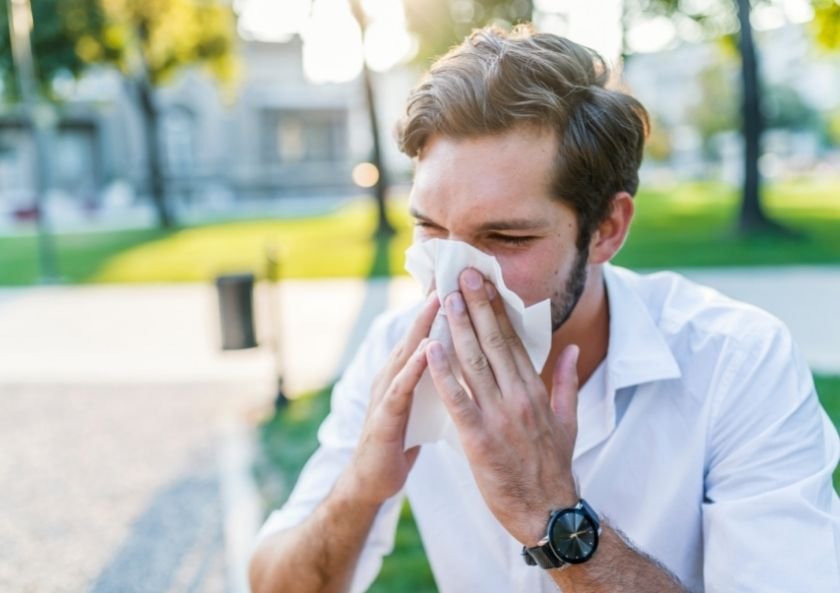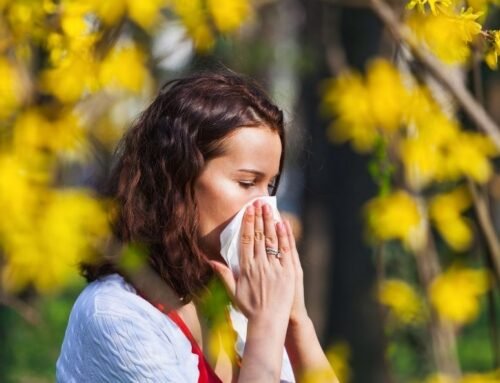Pollen allergy (Seasonal Allergy), which starts with the spring season, is a serious health problem that affects both the health and social life of people and disrupts the quality of life. Pollen allergy is not only in the form of nasal discharge, itching, congestion and sneezing, but unfortunately it brings other health problems in the future. Adults with pollen allergies need allergy tests to be diagnosed. Another major issue after being diagnosed with Pollen Allergy is how to treat it. In this article, we will try to give information about pollen allergy treatment.
What Should Be Done for Pollen Allergy Treatment?
As in all allergic diseases, there are many factors in pollen allergy, including treatment prevention, drug therapy, allergy vaccine, complementary therapy and education.
What is the Prevention Treatment in Pollen Allergy?
Since it occurs after contact with allergens that we are susceptible to in allergic diseases, prevention treatment in pollen allergy is carried out for the cause of complaints. If we are sensitive to any allergen, protection is made against that allergen.
After the allergens responsible for pollen allergy are detected by allergy tests, less allergic rhinitis complaints occur and less drug use is ensured thanks to the protection measures for them.
It would be appropriate for people with pollen allergy (seasonal allergy) to stay away from areas with lots of greenery in the spring season, not to go on a picnic, to work in the garden and to do sports. It is important to wear sunglasses outside, take a shower when you come home, and ventilate your clothes outside the bedroom. Windows should be kept closed at night. Using an air filter at home may benefit from having a pollen filter in your car. Despite all these protection measures, it is difficult to avoid pollen completely.
Pollen Allergy Drugs
Creams that reduce the entrance of pollen through the nose or sprays squeezed into the nose can be applied before going outdoors.
Adults with pollen allergies are very sensitive to their noses, which is why there is an overreaction to many chemicals. Especially the detergents, deodorants and perfumes that we use in our daily lives can cause sneezing, nasal itching. It should be said that adult patients with pollen allergy (seasonal allergy) should use cleaning materials such as odorless detergents and be careful when using perfumes with sharp scents.
Drug Therapy in Pollen Allergy Treatment
Pollen allergy, which starts with the spring season in adults, is a serious health problem that affects both the health and social life of the people and disrupts the quality of life. Complaints such as runny nose, itchy nose, congestion and sneezing should be prevented. Drug therapy in Pollen Allergy, drugs that correct the symptoms of allergic rhinitis and drugs that improve the symptoms are used. Most of the medicines we will use for pollen allergy are to relieve complaints. When we stop the medications we use for Pollen Allergy, (seasonal allergy) the patient’s complaints often come back. Antihistamines, nasal steroids and leukotriene receptor antagonists are the main drug groups used.
Pollen allergy sometimes does not happen alone. If there are other accompanying diseases, asthma or eczema, treatment should be started for these diseases.
Complaints such as urticaria can sometimes increase during pollen seasons. Especially in people with pollen allergy, urticarial rashes occur when patients eat fruit or vegetables because there is a cross reaction between pollens in fruits and vegetables. In this picture we call oral allergy syndrome, although the main cause is pollen allergy, cross-reacting fruit complaints occur. Therefore, both of them should be treated in urticaria patients with pollen allergy.
Drug treatment is required in pollen allergy. It helps to control the complaints, but its use alone will not prevent you from developing asthma in the future or the progress of the patient.
Are Allergy Vaccines Necessary in Pollen Allergy Treatment?
The best treatment method we have at the moment for pollen allergy treatment is vaccine therapy (immunotherapy). Vaccine treatment (immunotherapy) against the allergen that causes allergic rhinitis in adult patients is the best treatment method that can be applied to eliminate the complaints of the disease, prevent the progression of the disease and the development of asthma.
Allergy vaccine (immunotherapy) treatment is a treatment approved by the World Health Organization (WHO). With the use of allergy vaccines, the need for drug use decreases and the problem begins to occur with the allergens that previously caused complaints. In addition, if asthma is not developed, it can prevent the development of asthma in the future. Today, the only treatment that has the potential to stop the progression of allergic rhinitis to asthma is allergen-specific allergy vaccine.
In patients diagnosed with pollen allergy through allergy tests, it is necessary to apply allergy vaccines for the pollen allergy in patients. Allergy vaccines are made individually, depending on the pollen you are allergic to. Therefore, it is very important to be determined correctly.
Allergy vaccines for pollen allergy can be administered in the form of tablets or subcutaneous injection applied to the arm.
Allergy vaccines produced for pollen are extremely effective. Tablet or injection vaccines, especially initiated before the pollen season, allow the patient to spend the pollen season without complaints and without using drugs.
Education is Important for Pollen Allergy Treatment
The treatment of Pollen Allergy, as in other allergic diseases, consists of the combination of many parts. In the treatment of Pollen Allergy, each of these parts has a different place and should be evaluated as a whole. It is very important to provide training that explains how to do prevention methods in the treatment of Pollen Allergy, when and how to use drugs, how to use allergy vaccines.
If diagnosed and treated by allergists, the patient’s quality of life, work and school life improves, but if left untreated, a more dangerous process begins, resulting in asthma. Seasonal allergies should be taken seriously and treated.
As a result
With the arrival of the spring season, the pollens that appear can cause complaints of runny nose, sneezing, itching in the eyes or coughing.
The most common causes of seasonal allergy are tree, grass and weed pollen. It can also cause seasonal allergies in growing molds in spring.
The most important for the diagnosis of pollen allergy are allergy skin tests. For allergy testing, skin tests, which we call skin prick test, are preferred, but sometimes, blood allergy tests can be performed in patients who cannot be tested. Skin tests give more accurate results.
After the allergens responsible for pollen allergy are detected by allergy tests, less allergic rhinitis complaints occur and less drug use is ensured thanks to the protection measures for them.
Drug treatment is required in pollen allergy. It helps to control the complaints, but its use alone will not prevent you from developing asthma in the future or the progress of the patient.
The best treatment method we have at the moment for pollen allergy treatment is vaccine therapy (immunotherapy). Vaccine treatment (immunotherapy) against the allergen that causes allergic rhinitis in adult patients is the best treatment method that can be applied to eliminate the complaints of the disease, prevent the progression of the disease and the development of asthma.
Important information
Allergy Specialists (now called Immunology and Allergy Diseases Specialist) are doctors who have received special training in asthma and allergic diseases seen in those older than 18 years of age, and have received an Immunology and Allergy Specialist diploma and are also Internal Medicine or Chest Diseases or Dermatology Specialists.






